Editor:
Brandon Sweet
University Communications
bulletin@uwaterloo.ca
2018's exceptional student teachers honoured
The Amit and Meena Chakma Awards for Exceptional Teaching by a Student for 2018 will be presented to three student teachers at Convocation, Associate Provost, Graduate Studies and Postdoctoral Affairs Jeff Casello announced at Monday's meeting of the University's Senate.
The recipients are:
- Amanda Garcia, Systems Design Engineering;
- Quinlan Lee, Economics; and
- Anton Mosunov, Pure Mathematics.
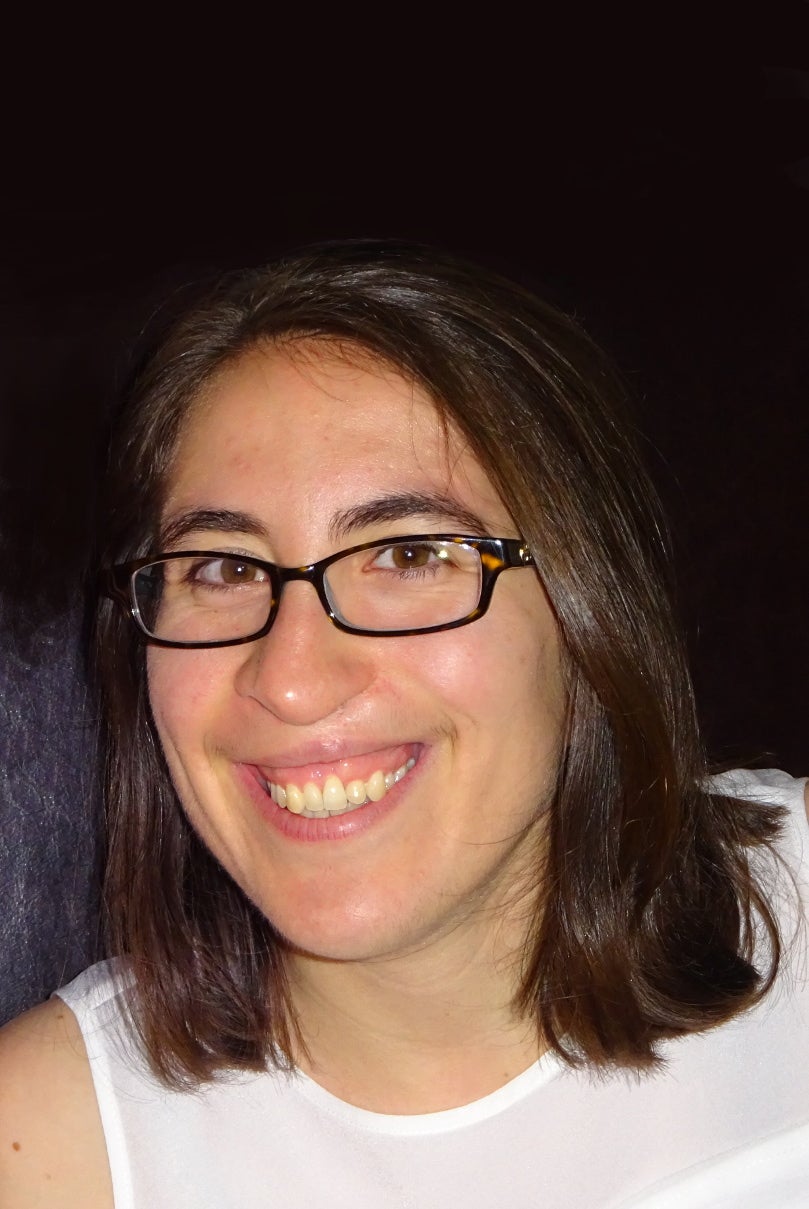 Amanda Garcia is a PhD student in the Department of Systems Design Engineering. Students and faculty members recognized her as an approachable, knowledgeable, and dedicated instructor. A student remarked that “it was very clear that she wanted the students to succeed as she went above and beyond to set up one-on-one extra help sessions, was flexible on group extra help times, and was very quick to respond to email questions.” Another undergraduate student commented on her flexibility as an instructor, saying that “Amanda was a great instructor because she was constantly willing to receive feedback and alter the way she was teaching the course for the better understanding of the students.” Garcia has also been described by faculty members as “extremely patient and understanding with students.” Garcia continues to keep her classes informative, relatable, and engaging. In 2017, she was the recipient of the University of Waterloo Certificate in University Teaching Award. Garcia has been an instructor for SYDE 533, INDEV 212, and INDEV 212, as well as a Teaching Assistant for SYDE 261.
Amanda Garcia is a PhD student in the Department of Systems Design Engineering. Students and faculty members recognized her as an approachable, knowledgeable, and dedicated instructor. A student remarked that “it was very clear that she wanted the students to succeed as she went above and beyond to set up one-on-one extra help sessions, was flexible on group extra help times, and was very quick to respond to email questions.” Another undergraduate student commented on her flexibility as an instructor, saying that “Amanda was a great instructor because she was constantly willing to receive feedback and alter the way she was teaching the course for the better understanding of the students.” Garcia has also been described by faculty members as “extremely patient and understanding with students.” Garcia continues to keep her classes informative, relatable, and engaging. In 2017, she was the recipient of the University of Waterloo Certificate in University Teaching Award. Garcia has been an instructor for SYDE 533, INDEV 212, and INDEV 212, as well as a Teaching Assistant for SYDE 261.
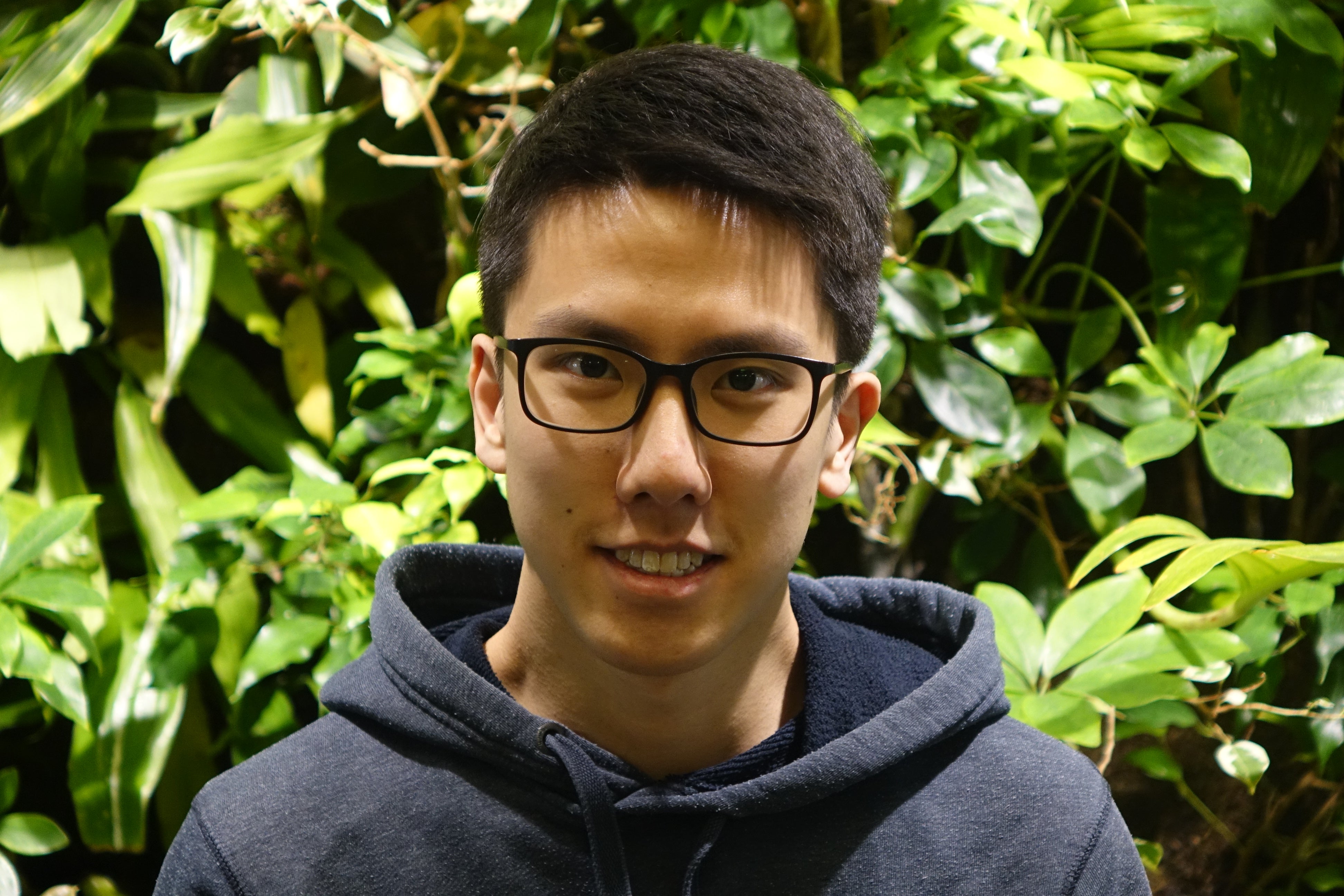
Quinlan Lee is an undergraduate student in the Department of Economics. Known by his students for his patience, Lee is recognized as “articulate, adept at breaking down difficult concepts and always adopt[ing] a genuine approach to guiding students toward a firm understanding of lecture material.” One student explained that “Quinlan provided a clear perspective on the material that goes beyond what was expected of a TA.” One faculty member noted that “the way he teaches the problems we agree that he will present and the way he explains how to tackle some problems are truly a complement to what I teach in class.” Lee has been a Teaching Assistant in Econ 323 for three terms over the course of his university career.
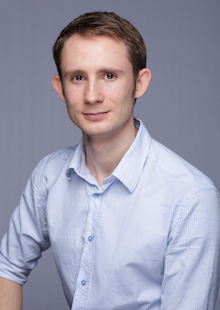 Anton Mosunov, a PhD student in Pure Mathematics, is highly recognized for his dedication to learning and teaching. When asked about Mosunov’s impact on student learning, one undergraduate student explained that “he made the content interesting and easy to follow for every student. Not only did he provide great lectures, he also provided course notes and class videos to. . . ensure that we fully understood the material outside of class.” Another student wrote that “at office hours, Anton was always helpful. Whether I had a question about the course content itself, or things beyond the scope of the course, he was always enthusiastic in answering, and recommended further reading to me which allowed me to learn much more than one course could teach.” In addition to his students’ support, a faculty member highlighted that “in all cases, he went well beyond what was expected of him and was an essential contributor to the success of the course.” His support serves as a testament to this recognition. Mosunov has been an instructor for Math 119, and PMATH 340. He has also been a teaching assistant for Math 147, Math 148, Math 647, and Math 648.
Anton Mosunov, a PhD student in Pure Mathematics, is highly recognized for his dedication to learning and teaching. When asked about Mosunov’s impact on student learning, one undergraduate student explained that “he made the content interesting and easy to follow for every student. Not only did he provide great lectures, he also provided course notes and class videos to. . . ensure that we fully understood the material outside of class.” Another student wrote that “at office hours, Anton was always helpful. Whether I had a question about the course content itself, or things beyond the scope of the course, he was always enthusiastic in answering, and recommended further reading to me which allowed me to learn much more than one course could teach.” In addition to his students’ support, a faculty member highlighted that “in all cases, he went well beyond what was expected of him and was an essential contributor to the success of the course.” His support serves as a testament to this recognition. Mosunov has been an instructor for Math 119, and PMATH 340. He has also been a teaching assistant for Math 147, Math 148, Math 647, and Math 648.
A tale of two co-ops
by Mona Qutub.
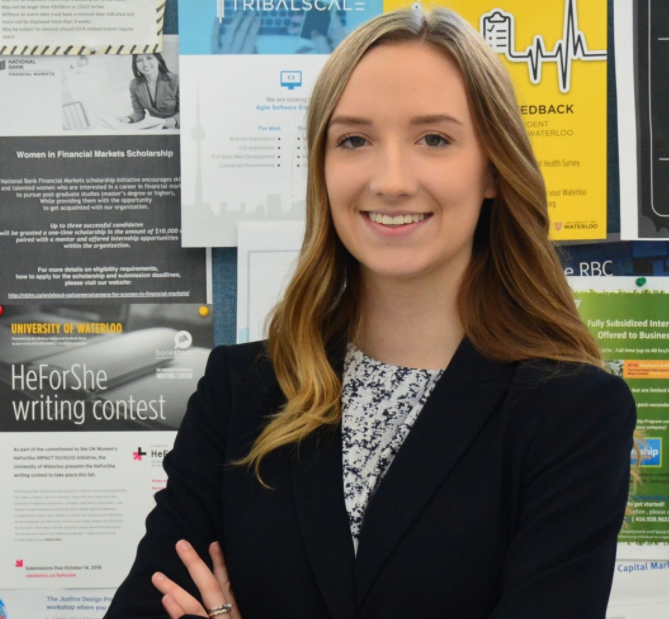 Public Health is everywhere, whether it involves creating a website as a health and wellness resource or providing students experiencing a mental health crisis the resources they need.
Public Health is everywhere, whether it involves creating a website as a health and wellness resource or providing students experiencing a mental health crisis the resources they need.
Juliane Koropeski didn’t always know how multi-disciplinary and broad Public Health was. It wasn’t until after she began her program and took on two very different co-op terms that she began to understand the depth of the field.
Public Health in human resources
Koropeski’s first co-op job was at the international engineering and project management firm Amec Foster Wheeler where she took on an administrative position in the company’s Human Resources department.
She was initially unsure as to what to expect from working in this department. Koropeski ended up learning more than she could ever imagine after developing a Health and Wellness website. It provided employees with valuable information on nutrition, physical activity, ergonomics, retirement and parenting resources, and chronic disease.
One of the coolest things she had the chance to do during this co-op term was visit the largest nuclear power plant in the world, the Bruce Nuclear Generating Station. Koropeski saw first-hand how safety policies and procedures were put in place to scan and test employees for how much radiation they’ve been exposed to.
Public Health on campus
Exploring another field in Public Health, Koropeski got her second co-op job working for Counselling Services at the University of Waterloo. She contributed to improving students’ mental health and well-being on campus. This was a challenging co-op work term for her, but also very rewarding.
The Public Health program at Waterloo looks at health from multiple perspectives. Biology isn’t the only thing that determines illness. Social, cultural, political, and geographical conditions play a pivotal role in individual and population health.
From two co-op experiences directly related to her program, Koropeski was exposed to many different disciplines that all play a critical but different role in shaping the health and well-being of individuals and communities.
The future?
Koropeski aspires to use her experiences and knowledge in Public Health to tackle some of the most pressing Public Health challenges in chronic disease prevention.
Meeting the needs of a changing world

This is the latest post on President Feridun Hamdullahpur's blog.
New ideas and technologies are disrupting the way the world as we know it operates.
Technological innovations that power strides in artificial intelligence, advanced manufacturing and autonomous vehicles are affecting the economies, lifestyles and demographics of the future. If we are to meet the challenges and opportunities these technologies present, we’re going to have to change with them.
Key to making this transition will be the world’s 22,000 universities, which are charged with exploring knowledge and with preparing the millions of students who study at their campuses for the road that lies ahead.
To meet these emerging challenges, the role of the university and how it operates will need to necessarily evolve. In addition to breaking down traditional silos within institutions themselves, universities will have to break down the barriers that exist between them and the world outside their campuses.
We’ll need to encourage the various disciplines to work together and ensure that groundbreaking discoveries make their way beyond the lab and the academic journal.
Our students will need to be more than just book-smart. They’ll need to be world-smart, and intimately familiar with the needs and challenges of the workplaces they hope to create or join.
This does not mean abandoning the traditions, fundamental values and principles that have made universities great: it just means growing them and making them more accessible. It means ensuring that we are adopting and expanding on ideas that have allowed academia to build a bridge between the practices of the past and the necessities of the future.
In the context of my own university, the University of Waterloo has had many opportunities to learn what works and what doesn’t when it comes to preparing our students for the next stages of their lives and ensuring that the contributions of our researchers are felt well beyond our campus. Ensuring that our students are exposed to the opportunities and challenges of the workplace was a founding principle of our institution and is embodied in what has become the largest cooperative education programme in the world. It’s a programme that sees our students work directly with industry during “work terms”.
We have also found that supporting and encouraging research at its most fundamental level and, at the same time, connecting it with a real-world application has been fundamental in building research relationships with companies across the world. These relationships, combined with a policy that allows researchers and students to keep the intellectual property they develop on our campus, have made partnerships with Waterloo increasingly sought after by emerging and established companies alike.
I believe it is this interface between the private and public sectors and academia that will need to be a major focus of all universities’ efforts if they are to contribute to the future in a way the world needs them to.
As the talent and research imperatives continue to grow, universities and the extensive abilities they house are going to have to become easier to navigate: less bureaucratic and providing a clear path of entry for external partners. Because change has become so rapid, industry will need to have the confidence that it can tap into that talent, solve its research problems and commercialise the findings at a speed its reality dictates, and with the integrity that only universities can offer.
For many institutions, this will require a type of relationship they may not be used to, and one that may at first be uncomfortable. The challenge of moving into this space will not be one of ability but one of culture. Meeting the needs of a changing world will require a greater understanding of emerging problems beyond academia and a vision that expands well past the boundaries of campus.
The reality is that change for universities has been coming for decades. The only question is how ready we are to adapt to it.
Feds members vote to fund racialized student service
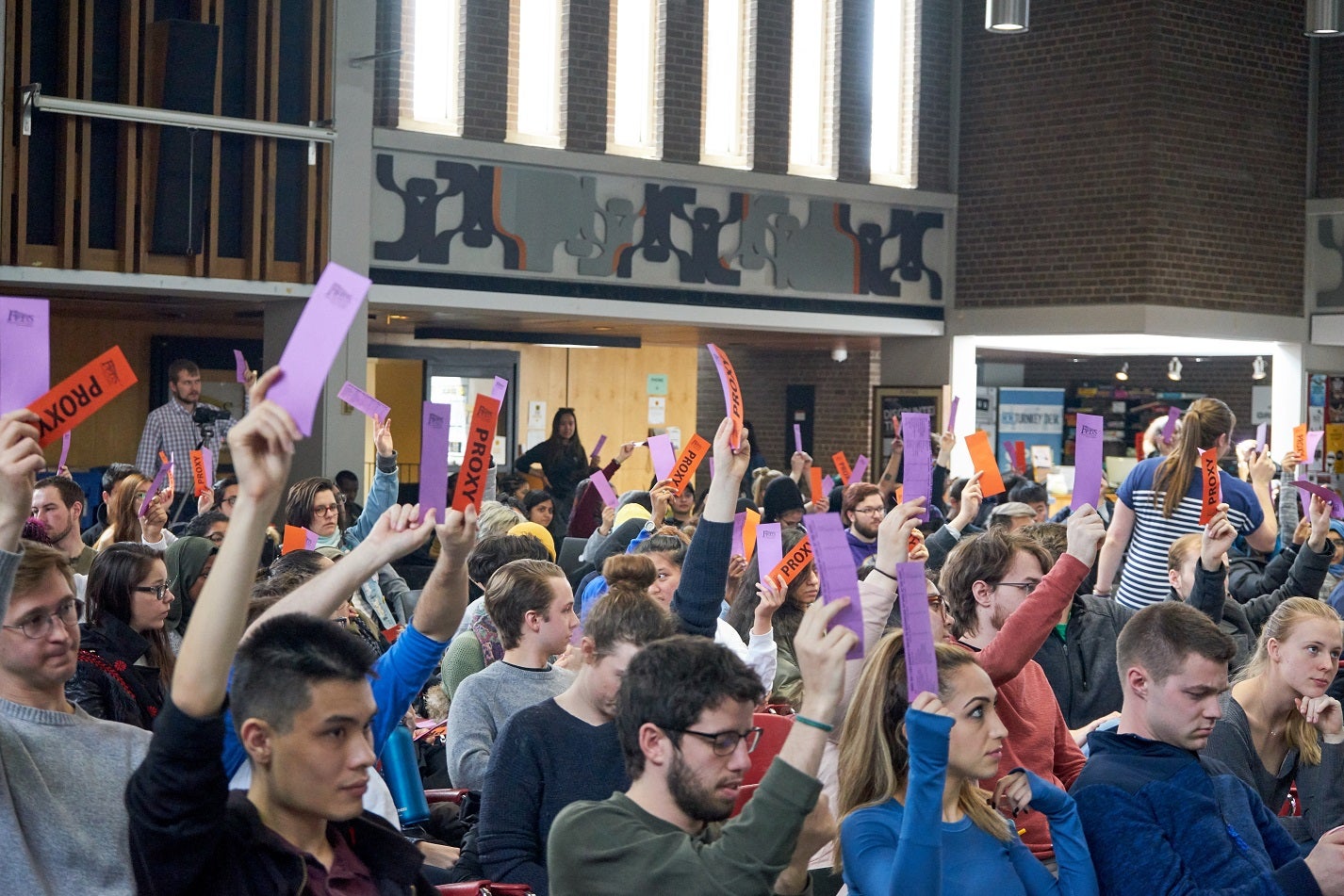
A proposal to create a new, student-run service to support the needs of racialized students on campus was passed at the Federation of Students’ (Feds) March 25 Students’ Council meeting. Students approved a fee increase to help fund the service’s creation at the Feds General Meeting on March 21.
“We are thrilled that our members decided to support this initiative and to support their fellow students who have expressed a need for it,” Feds president Antonio Brieva said.
Feds has a long history of supporting the needs of marginalized students on campus. From The Glow Centre for Sexual and Gender Diversity to The Women’s Centre, Feds Student Food Bank to Sustainable Campus Initiative (SCI), and International and Canadian Student Network (ICSN) to MATES, Feds has proudly supported the services created to address the gaps, inequities, and social and systemic barriers students may face on campus.
UWBASE (University of Waterloo Black Association for Student Expression) spearheaded this project by articulating a need to develop services for racialized students on campus in 2017. In consultation with UWBASE and other students, a new Feds student-run service was proposed.
The proposed service will seek to fulfill its vision of eliminating xenophobia and racial inequity on campus in addition to addressing the underrepresentation of racialized students in the post-secondary sector and creating a culturally-inclusive campus. It will aim to achieve this vision through education and advocacy; peer-to-peer support; and events and community building/outreach. This service will be available for all UWaterloo students to volunteer with and to access.
“Throughout this process, we have consulted with students,” said vice president internal Jill Knight. “As we move on to the next stage, there will be additional opportunities for students to provide input on what this service will look like.”
For more information or to get involved in the consultation process, please contact Antonio Brieva or Jill Knight.
Nutrition Month "myth vs. fact" for March 28
Here's the latest Nutrition Month "myth vs. fact" supplied by Health Services Dietitian Sandra Ace:
Myth: It’s hard to avoid food waste.
Fact: We all have good intentions at the grocery store - nobody likes to throw away food that didn’t get used in time. Yet almost half of all food waste generated in Canada originates from individual households. This mainly comes from food items we purchase with every intention of using but never do. Food waste costs the average Canadian household $1,456 per year or $364 per person. The David Suzuki Foundation reports that food waste rotting in landfills is responsible for 20 per cent of Canada’s methane (a greenhouse gas) emissions. Uneaten food also wastes the energy used to produce it – water, electricity and fuel for transportation.
You can reduce personal food waste by taking time to plan your meals and by finding creative ways to use leftovers. Set aside a few minutes each week to write a quick menu for the week ahead. Check your cupboards, refrigerator and freezer so you can include foods you have on hand that need to be used up. Write out a shopping list and stick to it, avoiding impulse buys - these typically increase grocery bills, waistlines and household waste. Shopping without a plan makes it difficult to estimate the right amount of food, with the tendency being to buy too much.
Plan to use highly perishable foods, like berries, fresh greens and ground meat, fresh fish and poultry, earlier in the week. If you do end up with organic waste, use a green bin to compost it. FoodKeeper is a helpful free Android or iPhone App developed by Cornell University’s Department of Food Science and the US Department of Agriculture’s Food Safety and Inspection Service to provide guidelines on the safe storage of food in the pantry, refrigerator and freezer that can help you to reduce waste.
Making small changes in our own households can collectively make a significant difference.
Upcoming office closures
The Arts Undergraduate Office will be closed today from 8:30 a.m. to 9:30 a.m. for a staff meeting.
The Human Resources department will close early at 3:30 p.m. on Thursday, March 29,for an office retirement event. Regular hours, 8:30-4:30, will resume on Monday, April 2. As always, HR will respond to HRhelp emails within 1-2 business days.
University Relations will be closed on Thursday, March 29 from 10:30 a.m. to 11:45 a.m. for a staff meeting.
The Arts Undergraduate Office will be closed on Thursday, March 29 from 11:30 am to 1:30 pm for a celebratory luncheon.
Link of the day
When and where
EURAXESS information session: European funding and networking opportunities, Wednesday, March 28, 10:30 a.m. to 11:30 a.m., QNC 1501.
University Club Easter Lunch Buffet, Wednesday, March 28 and Thursday, March 29, 11:30 a.m. to 2:00 p.m., University Club.
Single and Sexy 2018 auditions, Wednesday, March 28, 3:30 p.m., Modern Languages and Theatre of the Arts.
Vision Science Research Seminar Series featuring Dr. Christian Casanova, Université de Montréal, “Neurodegenerative diseases,” Wednesday, March 28, 4:30 p.m., OPT 347.
Global Populism and Democratic Futures Summit, Wednesday, March 28, 7:00 p.m. to Thursday, March 29, 8:00 p.m., Balsillie School of International Affairs.
Velocity Fund Finals, “20 startups compete for $125,000,” Wednesday, March 28, 11:00 a.m., SLC Great Hall.
Waterloo Women's Wednesdays: A Conversation about Mental Health, Wednesday, March 28, 12:00 p.m., MC 5501.
Debbie Dietrich retirement celebration, Thursday, March 29, 2:00 p.m. to 4:00 p.m., Grad House. Refreshments will be provided. All welcome.
WaterTalk: Winter Conditions, Ice, and Climate Change on Lake Superior, Thursday, March 29, 2:30 p.m., DC 1302.
Retirement celebration for Freddie Swainston, Thursday, March 29, 3:30 p.m., University Club. RSVP on the HR Events page.
Multiple-Mini Interview (MMI) Practice Session, Thursday, March 29, 5:30 p.m., TC 1214.
Holy Thursday Liturgy, Thursday, March 29, 7:00 p.m., St. Jerome’s University Notre Dame Chapel.
orchestra@uwaterloo: Unfinished Business Concert, Thursday, March 29, 7:30 p.m.., Humanities Theatre. Free Admission.
Good Friday holiday, Friday, March 30, most university buildings and operations closed.
Good Friday Service, Friday, March 30, 3:00 p.m., St. Jerome’s University Notre Dame Chapel.
UWaterloo Chamber Choir: Bach’s St. John Passion, Friday, March 30, 7:30 p.m., Centre in the Square, 101 Queen St. Kitchener. $30 to $82.
Easter Vigil Liturgy, Saturday March 31, 8:00 p.m., St. Jerome’s University Notre Dame Chapel.
Free Exam Fitness, Monday, April 2 to April 20.
Voices for Gender Justice in Education, Tuesday, April 3, 12:00 p.m., Dunker Family Lounge, Renison University College.
Board of Governors meeting, Tuesday, April 3, 1:30 p.m., NH 3407.
AquaHacking Information Mixer, Tuesday, April 3, 2:00 p.m. to 4:00 p.m., J .R. Coutts Engineering Lecture Hall (RCH) Room 306.
Stratford Campus presents 2018 Project Showcase and Reception, Tuesday, April 3, 3:30 p.m., Stratford Campus.
NEW - EDGE for Arts Students - Skill Identification and Articulation - undergraduate students only, Tuesday, April 3, 5:30 p.m., TC 2218.
Lectures and classes end, Wednesday, April 4.
Copyright and Your Thesis, Wednesday, April 4, 1:30 p.m., LIB 329 FLEX lab.
Knowledge Integration Symposium, Wednesday, April 4, 4:00 p.m. to 6 p.m., Minto Atrium, Environment 3.
Turn Your Research Into a Startup, 'Panel with local founders and UWaterloo professors,' Wednesday, April 4, 6:00 p.m. to 9:00 p.m., The Graduate House.
2018 University of Waterloo Staff Conference, Thursday, April 5 and Friday, April 6, Science Teaching Complex.
Pre-examination study days, Thursday, April 5 and Friday, April 6.
Faculty Tenure and Promotion Workshops, Thursday, April 5 and Friday, April 6.
Faculty Recently Hired to their First Probationary Term Workshop, Thursday, April 5, 10:00 a.m. to 11:30 a.m., STC 3014.
Faculty Association Spring General Meeting, Thursday, April 5, 11:30 a.m. to 1:30 p.m., QNC 2502.
Research Talks: Contemporary Indigenous issues in Canada featuring Lori Campbell, Jasmin Habib, Dan McCarthy, and Susan Roy, Thursday, April 5, 11:45 a.m. to 1:00 p.m. Please register as seating is limited.
NEW - Professional School Interviews (Standard & MMI) Q&A, Thursday, April 5, 1:00 p.m., TC 1112
QPR Training, Thursday, April 5, 2:00 p.m., Counselling Services, Needles Hall.
NEW - UWaterloo Pharmacy Admission Interviews, Thursday, April 5, 3:00 p.m., TC 2218.
Faculty Applying for Tenure Workshop, Thursday, April 5, 2:30 p.m. to 4:00 p.m., NH 3318.
Mush Hole Remembered, Thursday, April 5, 5:00 p.m., Dunker Family Lounge, Renison University College.
University of Waterloo Brain Day, Friday, April 6.
2018 Waterloo Economics Workshop, "Current Challenges in Environmental and Natural Resource Economics," Friday, April 6, 9:00 a.m., EIT 1015.
A (self) reflexive lens on gerontology, public lecture by CIHR VP, Prof. Anne Martin-Matthews in honour of William Forbes, founder of Waterloo’s Gerontology program. Friday, April 6, 9:30 a.m. to noon, AHS 1689.
Faculty Applying for Probationary Contract Renewal Workshop, Friday, April 6, 10:00 a.m. to 11:30 a.m., MC 5417.
HeForShe presents Health and Pre-Tenure University Women workshop, Friday, April 6, 11:30 a.m. to 1:00 p.m., MC 5501.
Faculty Applying for Promotion to Full Professor Workshop, Friday, April 6, 1:00 p.m. to 2:30 p.m., MC 5417.
2018 University of Waterloo Brain Bee, Saturday, April 7, 9:30 a.m. to 2:00 p.m., AHS 1689.
Examinations begin, Monday, April 9.
Intellectual Property Workshop Series, “Trademarks”, Tuesday, April 10, 12:30 p.m., DC 1304. Supported by the Centre for Bioengineering and Biotechnology (CBB), the Games Institute, and WatCo.
Tri-Agency Open Access Policy - From Author's Rights to UWSpace, Wednesday, April 11, 10:00 a.m., DC 1568.
NEW - Master of Business, Entrepreneurship and Technology (MBET) Information Session, Wednesday, April 11, 5:30 p.m., Online Webinar
Lectures in Catholic Experience, “Dead Man Walking: The Journey Continues,” featuring Sr. Helen Prejean, CSJ, Ministry Against the Death Penalty, Friday, April 13, 7:30 p.m., St. Jerome’s University, Academic Centre Vanstone Lecture Hall.
CrySP Speaker Series on Privacy featuring Joel Reardon, University of Calgary, ““Won’t Somebody Think of the Children?” Examining COPPA Compliance at Scale,” Thursday, April 19, 2:30 p.m., DC 1304.
Positions available
On this week's list from the human resources department, viewable on the UWaterloo Talent Acquisition System (iCIMS):
- Job ID# 2018-2595 - Academic Advisor - Arts Undergraduate Office, USG 8
- Job ID# 2018-2582 - Academic Advisor, International Students - Science Undergrad Office, USG 8
- Job ID# 2018-2594 - Computing Consultant (Portal, Web Development) - Information Systems and Technology, USG 10
- Job ID# 2018-2528 - Development Officer, Leadership Giving - Advancement-Leadership Giving, USG 9 – 11
- Job ID# 2018-2542 - Library Clerk: Resource Sharing – Library, USG 3
- Job ID# 2018-2591- Records Assistant – Registrar, USG 5 – 7
- Job ID# 2018-2479 - Support Services Coordinator - English Language & Literature, USG 5
- Job ID# 2018-2590 - Support Services Coordinator – Economics, USG 5
Internal secondment opportunities:
- Job ID# 2018-2602 - Faculty Relations Manager – Co-op Education & Career Action, USG 12
- Job ID# 2018-2600 - Information Systems Specialist (Business Analyst) - Information Systems and Technology, USG 12 – 13
- Job ID# 2018-2543 - Library Clerk: Resource Sharing – Library, USG 3
- Job ID# 2018-2488 - New Student Transition Coordinator - Student Success Office, USG 7
- Job ID# 2018-2579 - Payroll Administrator - Human Resources, USG 5